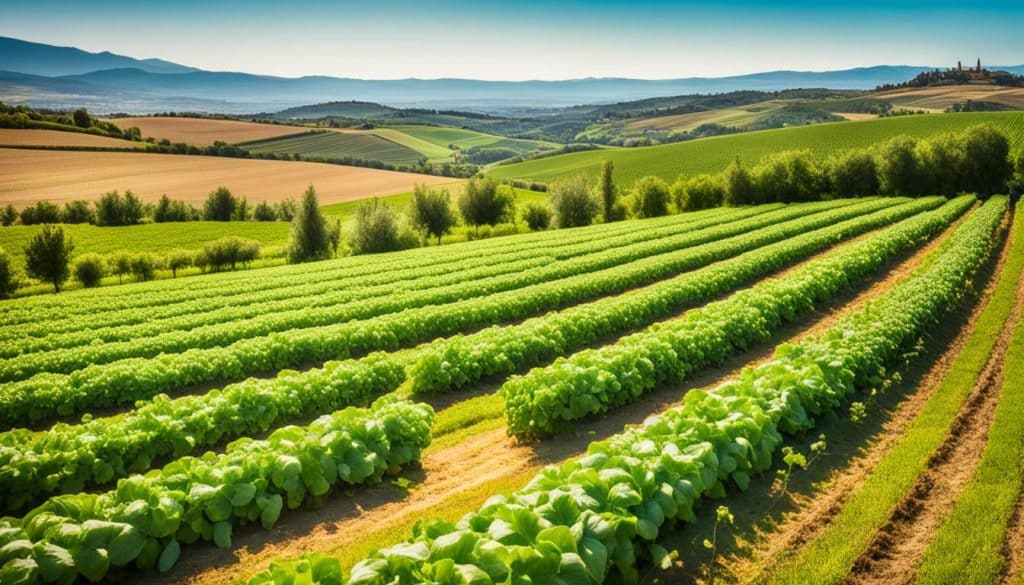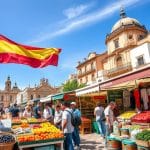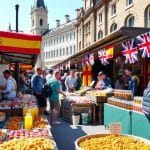In recent years, organic farming in Spain has gained a lot of fans. People are choosing to live more sustainably and eat healthier. Data reveals a big jump in organic farming across the EU. From 2012 to 2020, organic land use shot up by more than 50%. Each year, it grew by 5.7%.
In 2020, 9.1% of the EU’s farms were organic. Spain, France, Italy, and Germany lead this movement. They make up 59% of the EU’s organic farming area as of 2020.
Key Takeaways:
- Organic farming in Spain has become more popular as people embrace sustainable living and healthier food choices.
- The share of organic farming land in the EU has increased by over 50% from 2012 to 2020, with an annual growth rate of 5.7%.
- In 2020, organic farming accounted for 9.1% of the EU’s agricultural area.
- Spain, along with France, Italy, and Germany, is one of the top four countries with the largest area under organic farming in the EU.
- These countries accounted for 59% of the total organic farming area in the EU in 2020.
Growth in Retail Sales of Organic Products
In Spain, organic farming has become more popular. As a result, the retail sales of organic products have skyrocketed. From 2015 to 2020, sales in the EU doubled, showing a big jump in consumer interest for organic foods and goods.
The European Commission shared a report about the booming organic product market. It credits successful strategies for keeping demand high, especially during the COVID-19 pandemic. People started to care more about their health and chose organic foods more often, boosting sales.
Even with challenges like food inflation, the interest in organic farming and products is still growing. These tough times might affect how much people can spend, but they still lean towards buying organic.
Organic Farming in the EU
The EU backs organic farming with policies and help. Farms doing organic plant work use less on fertilizers and boo-boo spray. They save heaps on costs per hectare for these things, unlike regular farms.
Even if they often get less crop, organic farms can still make as much or more money per worker. This is thanks to the high prices of organic foods and the EU’s help through the Common Agricultural Policy (CAP).
Quite a lot of EU organic land, 61.6%, got extra money from the CAP in 2020. Each hectare got an average of €144 plus €79 more from each country. This money is very important for keeping organic farming going strong.
The next CAP, starting in 2023, will give more support to organic farming. This shows the EU’s big plan to help organic farming grow more across its countries.
Organic Farming in Spain
Spain is a leading country in the European Union for organic farming. In 2020, it had a large area devoted to this. This makes it one of the top four EU countries for organic agriculture.
The biggest part of its organic land is used for grassland. After that comes green fodder, cereals, and permanent crops like fruits, olives, and vineyards. Organic animal farming makes up a small part of Spain’s total animal production. This ranges from 1% to 7% depending on the sector.
However, the rise of organic food stores and major retailers stocking organic products shows a growing interest. It indicates that organic farming is becoming more popular in Spain.
Increase in Organic Food Stores
More organic food stores are popping up in Spain, showing people want more organic options. Before, only a few stores offered a small range of organic foods. Most were limited to some fruits and shelf-stable goods.
Things have changed, with new organic stores opening nationwide. The Ecorganics chain is one such example. It has opened new locations in places like Valencia and Bilbao. These stores meet the growing demand for fresh, quality organic food. They offer a large selection of meats, dairy, and other products.
Small, independent stores like Planeta Eco in Xalo have also appeared. They provide fresh, local organic produce to customers. These shops add to Spain’s thriving organic food scene. They offer a distinct and varied shopping experience.
Availability of Organic Food in Major Supermarkets
Supermarkets in Spain, like Lidl, Aldi, Consum, and Carrefour, have greatly expanded their organic food selections. They now offer a variety of organic products such as meat, dairy, and fresh veggies. This makes it easier for people to find and buy organic food.
Consumers are now more interested in foods that are both sustainable and healthier. As a result, these supermarkets now offer more organic choices. This lets more people add organic products to their meals easily.
The focus of these supermarkets is on the freshness and quality of their organic foods. Shoppers can be confident that the organic goods they buy meet all necessary organic certification standards.
Please note: It’s great that organic foods are more available in big supermarkets. However, we shouldn’t forget about small organic shops and local sellers. These places often work closely with local farmers, use less packaging, and have special organic items.
When we shop at both large supermarkets and small organic stores, we get a broader selection of organic goods. This also helps local farmers and encourages green practices.
Benefits of Organic Farming
Organic farming has many benefits, making it a great choice for both farmers and shoppers. Farmers who use organic methods support sustainable agriculture. They help keep our environment clean. Sustainable farming means healthier ecosystems and better future for farming.
Promotes Sustainability
Organic farming is all about being sustainable. It avoids synthetic fertilisers and pesticides. Instead, it uses nature-friendly ways to boost soil health, like rotating crops, making compost, and managing pests naturally. This helps protect our planet and supports sustainability for years to come.
Cost Savings
Going organic can also save money. Organic farms use less synthetic stuff like chemical fertilisers and pest killers. So, they spend less on these inputs. This makes farming more sustainable economically.
Comparable or Higher Income
Some think organic farming means lower incomes. But, research shows organic farmers may earn as much or more. They get better prices for organic foods because people are willing to pay for health and environmental benefits.
Richer in Nutrients
Organic foods often have more vitamins and minerals than non-organic ones. The practices used in organic farming boost soil health and biodiversity. This makes organic crops more nutrient-dense. Choosing organic means tastier foods with more nutritional benefits.
Knowing the benefits of organic farming helps us make choices that support sustainable farming. It also leads to healthier food choices. The rising popularity of organic items shows more people are choosing a healthier, eco-friendly way of eating and farming.
| Benefits of Organic Farming |
|---|
| Sustainable agricultural practices |
| Reduces reliance on synthetic fertilisers and pesticides |
| Cost savings on synthetic inputs |
| Comparable or higher income per worker |
| Richer in vitamins and minerals |
Consumer Demand for Organic Food
Organic farming in Spain is becoming more popular. This is because more people want to buy organic food. The boost in organic sales during the COVID-19 pandemic showed us that people care about their health. They prefer food that is better for them.
This trend of choosing organic will likely keep up as people understand its benefits more. These benefits include a better environment and improved personal health. Even though money issues and food prices may affect what people can buy, the demand for organic items is still strong. This shows we need to keep supporting organic farming. Making it more available in the market is also important.
More people now want to eat organic food because it’s healthier and more sustainable. The pandemic has made us realise how important our health is. So, people are choosing organic products. They know these products have more nutrients and fewer chemicals.
People know more about how organic farming helps the soil and preserves nature. It also lessens harm to our environment. As a result, more folks are choosing to buy organic instead of regular farm products.
Even with economic ups and downs, people’s wish for organic food stays strong. This interest gives organic farmers a chance to grow their work. It means that more organic farming can happen to meet what people want.
| Factors Driving Consumer Demand for Organic Food |
|---|
| Increasing health-consciousness |
| Preference for sustainable and environmentally-friendly products |
| Awareness of the benefits of organic farming |
| Higher nutritional value of organic produce |
As more people want organic food, it’s key to help organic farmers. We need to make sure organic products are easy to find in shops. This means making policies that favour organic farming. Also, it involves financial help and working together with farmers, shops, and buyers.
The future of organic farming in Spain depends on people continuing to buy organic food. It also relies on sticking with farming that cares for the environment. By teaching people more about organic farming’s benefits, we can grow the organic food market. This will lead to a healthier and greener future.
Organic Farming and Sustainable Food Systems
Organic farming is key for a sustainable EU food system. The European Commission wants 25% of the EU’s farm land to be organic by 2030. This aim supports the Farm to Fork and Biodiversity strategies.
Countries in the EU are urged to aim high with their own organic farming goals. They should do this in their CAP strategic plans and national organic action plans. Supporting organic farming is part of the EU’s Green Deal. It shows the EU’s dedication to sustainable farming and food production.
Impact of Organic Farming on Agriculture
Organic farming is a green alternative to usual farming ways. It helps EU agriculture by cutting down on harmful chemicals. By using less synthetic fertilizers and pesticides, it helps the planet. Even if organic farms don’t make as much produce, they still earn well. This is because they sell their produce for more money and get help from policies like the Common Agricultural Policy (CAP).
Also, organic farming brings back old, earth-friendly ways of growing crops. It helps different plants and animals live together well and keeps the soil healthy. It uses crop rotation, fights pests in natural ways, and uses organic materials to feed the soil. These methods make the soil stronger and help it hold more nutrients. It also makes farming ecosystems more able to handle changes.
Organic farming does more than just change how one farm works. It leads to big changes in how all of EU farming works. More organic farms in Spain and the EU show farming is becoming more green. This matches the EU’s goal to farm in a way that’s better for the planet. It aims to make our food system last long into the future.
| Impact of Organic Farming | EU Agriculture |
|---|---|
| Reduces reliance on synthetic fertilizers and pesticides | Minimizes environmental impact and promotes sustainable practices |
| Lower yields compensated by higher prices and support from CAP | Maintains similar or higher income per worker compared to conventional farms |
| Promotes traditional and environmentally-friendly planting methods | Enhances biodiversity and soil health |
| Strengthens soil structure and improves nutrient cycling | Contributes to the resilience of agricultural ecosystems |
| Contributes to the overall sustainability of EU agriculture | Aligns with the EU’s commitment to reducing environmental impact |
Role of EU Support for Organic Farming
The European Union (EU) is key in backing organic farming. It does this through the Common Agricultural Policy (CAP) and other rural plans. This support is crucial for organic farming’s growth in Spain and the whole EU.
In 2020, about 61.6% of EU land for organic farming got special CAP payments. This money helps organic farmers with conversion and upkeep costs. Thus, making organic farming a viable choice.
Organic farmers in challenging areas get extra funds too. This allows organic farming to succeed in varied agricultural settings. It also helps with the sustainable use of land.
The new CAP, starting in 2023, plans to boost support for organic farming. The aim is to use more Agricultural Area for organic farming under CAP. This shows the EU’s strong commitment to organic farming.
Benefits of EU Support for Organic Farming
The EU’s CAP support offers many advantages for organic farmers and agriculture:
- Economic Stability: CAP support gives organic farmers a steady income. This helps them invest in sustainable practices on their farms.
- Market Access: EU support helps organic farmers reach more buyers. It makes it easier for them to sell their organic products.
- Sustainable Agriculture: Organic farming fits with the EU’s sustainability and environment goals. CAP boosts farming methods that increase biodiversity, reduce harmful inputs, and protect the soil.
- Farm Viability: The EU gives specific help to organic farms. This recognizes the unique challenges they face and makes organic farming more feasible.
The EU’s backing does more than help farmers. It leads to a greener, more eco-friendly food system. By buying organic, people in the UK and EU support these farmers. They also better their health and help preserve the environment.
Comparison of EU Support for Organic Farming
| Year | Percentage of EU Land under Organic Farming | Specific Support Payments from CAP (Percentage of Organic Area) | Average CAP Support per Hectare |
|---|---|---|---|
| 2020 | 61.6% | XX% | €XX/ha |
| 2019 | XX% | XX% | €XX/ha |
| 2018 | XX% | XX% | €XX/ha |
Note: CAP’s specific support payments can change yearly and by EU country. The average CAP support per hectare is based on the data for organic farming in the EU.
Future Outlook for Organic Farming in Spain
The future of organic farming in Spain looks very promising. More and more people are buying organic foods. This means there’s a big chance for growth in this area. Ecorganics, a store that sells only organic goods, is opening new shops in cities like Valencia and Bilbao. They’re meeting the higher demand for organic foods. Big supermarkets like Lidl and Carrefour are also offering more organic options to their customers.
The European Union is backing organic farming in Spain with special plans. These plans aim to make organic farming bigger and better. People now prefer food that’s healthy and good for the planet. This change in what consumers want is a big reason why organic farming is set to play a major role in Spain’s agriculture. It’s leading us to a future that’s greener and healthier.
Importance of Organic Farming
Organic farming is vital for sustainable living and healthier eating. It cuts down on synthetic fertilizers and pesticides. This protects our planet and keeps the soil healthy. Organic products are nutritious and taste better, making us healthier. Spain and the EU see more people choosing organic, showing they value sustainable farming. People understand the need for eco-friendly food production.
Organic farming is great for a sustainable food system. Here are some key benefits:
- It supports a greener environment. Organic farming uses natural methods, avoiding harmful chemicals. This protects our soil and water and keeps animals and plants diverse. Growing crops this way also lowers carbon emissions, helping fight climate change.
- It keeps soil fertile and healthy. Organic farmers use compost and manure rather than chemical fertilizers. These natural materials improve soil and help it hold more water. They also help good microbes thrive. So, organic farming keeps soil healthy for future farming.
- It increases biodiversity. Organic farms are home to many plants and animals. By not using pesticides and growing different crops, these farms help pollinators and other helpful creatures. This creates a balanced ecosystem and protects biodiversity.
- It is better for our health. Organic food doesn’t have synthetic pesticides or GMOs. Studies show organic fruits, veggies, and grains have more nutrients and antioxidants. Also, organic meat and dairy come from animals raised without antibiotics or growth hormones. So, organic options are healthier.
We must continue supporting organic farming for a better future. Choosing organic products helps protect our planet, improve our health, and make society better. By backing local organic farmers, we can make a big difference.
Organic Farming Certification and Labels
When buying organic, look for trusted certifications and labels. In the UK, the Soil Association Organic Certification tells you the product meets top organic standards. Other well-known labels include Organic Farmers & Growers and the Organic Food Federation. These labels mean the food is truly organic and up to standard.
| Organic Certification and Label | Description | Website |
|---|---|---|
| Soil Association Organic Certification | The Soil Association is the top organic certifier in the UK. They make sure products are truly organic and promote green farming. | www.soilassociation.org |
| Organic Farmers & Growers | Organic Farmers & Growers (OF&G) certifies organic farmers and food producers in the UK. They help the organic sector grow. | www.ofgorganic.org |
| Organic Food Federation | The Organic Food Federation checks organic foods and products in the UK and Europe. They ensure these meet organic standards. | www.orgfoodfed.com |
Always check for these certifications when shopping for organic. This way, you support real organic farming and get all the benefits of organic food.
Conclusion
Organic farming is becoming more popular in Spain. It uses a significant part of EU agricultural land for organic production. Retail sales of organic products are on the rise too.
Organic farming has many benefits. It’s good for the environment and provides tastier, more nutritious food. It also helps local farmers and producers. Thanks to EU support and a move towards sustainable food, organic farming in Spain is set to grow.
This growth means a better future for consumers and the planet. Spain is leading in organic farming practices. It offers consumers great organic products and helps keep farming sustainable. The future looks promising for Spain’s organic farming, impacting agriculture and people’s health positively.














